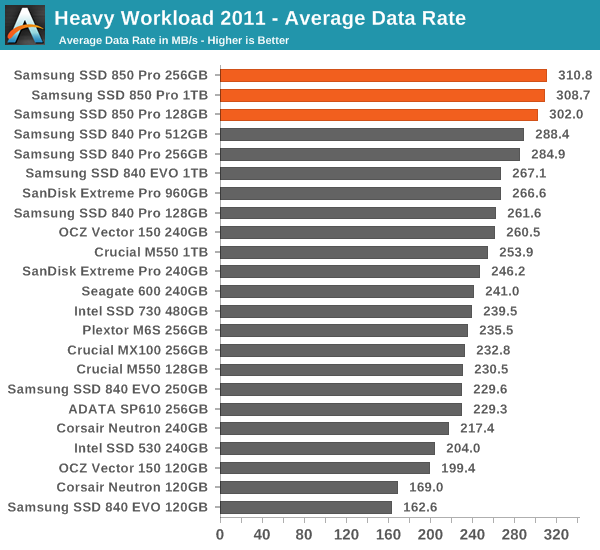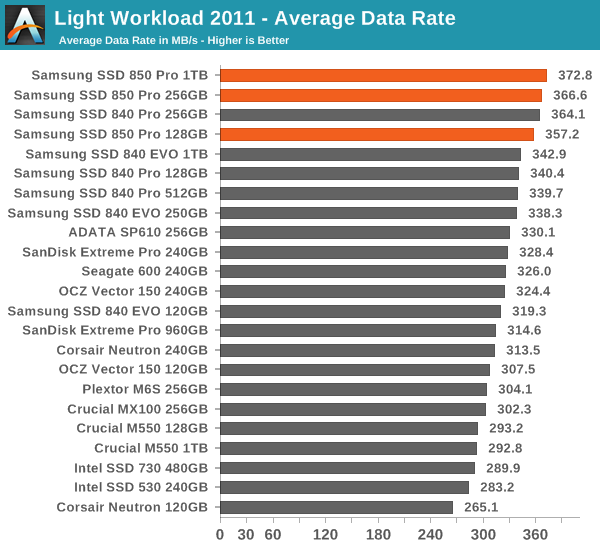Samsung SSD 850 Pro (128GB, 256GB & 1TB) Review: Enter the 3D Era
by Kristian Vättö on July 1, 2014 10:00 AM ESTAnandTech Storage Bench 2011
Back in 2011 (which seems like so long ago now!), we introduced our AnandTech Storage Bench, a suite of benchmarks that took traces of real OS/application usage and played them back in a repeatable manner. The MOASB, officially called AnandTech Storage Bench 2011 - Heavy Workload, mainly focuses on peak IO performance and basic garbage collection routines. There is a lot of downloading and application installing that happens during the course of this test. Our thinking was that it's during application installs, file copies, downloading and multitasking with all of this that you can really notice performance differences between drives. The full description of the Heavy test can be found here, while the Light workload details are here.

The dominance continues in our 2011 Storage Benches. The 840 Pro was already the fastest drive in both suites, so it does not come as a surprise that the 850 Pro takes the lead.











160 Comments
View All Comments
alacard - Monday, June 30, 2014 - link
Fascinating stuff, thanks for the in depth analysis.Iketh - Tuesday, July 1, 2014 - link
Good read on the software not taking advantage of SSDs yet. Windows is the biggest offender. I have 8 threads and an SSD and I still have to wait for each of my startup programs to load like a snail 1 at a time after bootup...tetsuo77 - Monday, June 30, 2014 - link
"There are some drops, although I am not sure what is causing them"It looks suspiciously like your values overflowed an unsigned int (prior to being converted from B to KB). Just add ~4.3 million to the 4 mysteriously low values and you have a nicely shaped curve.
tetsuo77 - Monday, June 30, 2014 - link
Oops.. I pasted the wrong quote. Meant to quote this: "It looks like read performance scales quite linearly until hitting the IO size of 256KB where RAPID stops caching"I maintain that there is an error in the numbers on the graph :)
Gigaplex - Tuesday, July 1, 2014 - link
32 bit unsigned integers support around 4.3 billion, not million.lyeoh - Friday, July 4, 2014 - link
if the values were being stored internally as bytes and not kilobytes it might overflow as tetsuo77 mentioned. 4.3 million * kilobytes per sec = billions of bytes/sec which could overflow.nirwander - Monday, June 30, 2014 - link
I cant see how they aim at mainstream with these prices.Crucial MX100 512 is already fast enough for SATA 6 Gbps and.. twice as cheap!
Technology geeks will probaly go for Intel PCIe NVMe drives.
Gigaplex - Monday, June 30, 2014 - link
And if you really need the performance, just get two of the MX100s and RAID 0 them.willis936 - Tuesday, July 1, 2014 - link
Unless you care about storage latency at all.Gigaplex - Tuesday, July 1, 2014 - link
Fair point, but SSDs are so far ahead of hard drives in terms of latency that it hardly matters.